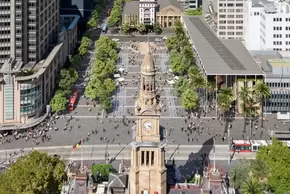
 Giovanni di Paolo, “St. John the Baptist in Prison Visited by Two Disciples,” ca. 1455-1460 (photo: Public Domain) Giovanni di Paolo, “St. John the Baptist in Prison Visited by Two Disciples,” ca. 1455-1460 (photo: Public Domain) Try as I might, I have always found John the Baptist to be an off-putting, and certainly a disturbing, figure in the Christian story. And I have tried. For I was ordained deacon in St John at Hackney, a church named after John the Baptist, and I served in the community there. Each year, we would have our patronal festival, and try to find ways to see how the Baptist could relate to our usual church life. To be honest, it was easier than in the past. For St John at Hackney was originally a very high society church – indeed, the focal borough church in Hackney - and its impressive churchyard still contains many notable figures, such as the Baden Powell family, from whom the worldwide scouting movement issued. By the 1980s however, Hackney was both London’s poorest and most multicultural borough, and our congregation was very different; all part of the Anglican Church’s journey in the inner cities from being the church of ‘the great and the good’ to being one of the ‘marginal and the odd’. Over half of our congregation also drew their origins from West Africa or the West Indies. Well, maybe John the Baptist might have felt somewhat at home, being on the prophetic margins of his society. Yet his appearance and demeanour would still have marked him out. Indeed, even some of the more radical and vibrant of our congregation would have struggled with some of his language of repentance and its tone. Similarly, I suspect that we would not be wholly comfortable with him here. For John the Baptist was most certainly a ‘disturber of the peace’ in very uncomfortable ways. Indeed, the story of his violent death we heard this morning is hardly the most attractive within the Bible. So what do we make of it, and of the Baptist’s significance within our faith journey?...  Where, to what, and, perhaps most importantly of all, to whom do you, do we, belong? These are core questions at the heart of faith, and of life itself. Let me therefore begin with a little quiz question, to which those who know 1980s popular music may be able to respond. Who sang the following words? If it helps, think of it sung falsetto by a redheaded young man: You leave in the morning with everything you own in a little black case Alone on a platform, the wind and the rain on a sad and lonely face Mother will never understand why you had to leave But the answers you seek will never be found at home The love that you need will never be found at home The song is Smalltown Boy, sung by Jimmy Somerville, from the British synth-pop band Bronski Beat’s album Age of Consent. It came out in 1984, at the height of Margaret Thatcher’s political power, and, for folk like me – not least small town kids like me – it was emblematic both of protest against oppression and of the creative, joyous, expression of queer courage and change. Indeed, among other things, Bronski Beat also headlined ‘Pits and Perverts’, a concert in London’s Electric Ballroom to raise funds for the Lesbians and Gays support the Miners campaign: an event featured in the film Pride. Smalltown Boy also reached number 8 in the Australian charts and it is but one symbol of the historical struggle which has led, finally this week, to a formal apology from the New South Wales government for the horrendous abuse and violence that has been inflicted on queer people, and not least on gay young men who were told, in no uncertain terms, that they did not belong. Yes, let us celebrate that! Today Smalltown Boy is a celebration of what was largely still a declaration not to be crushed, but to survive, and thrive. For as Jimmy Somerville sang: Pushed around and kicked around, always a lonely boy You were the one that they'd talk about around town as they put you down And as hard as they would try they'd hurt to make you cry But you never cried to them, just to your soul No, you never cried to them, just to your soul Soul power eh? As Jesus, another smalltown kid, taught, and showed, this is ultimately at the heart of any life-giving change. For it is where we find our true belonging…  image: Brandy Martell, 400 block of 13th St near Frankland St, Oakland image: Brandy Martell, 400 block of 13th St near Frankland St, Oakland ‘Tell all the truth', wrote the poet Emily Dickenson, 'but tell it slant’. For ‘The Truth must dazzle gradually/Or every one be blind.’[1] That is pretty much Mark’s Gospel’s account of resurrection, isn’t it? Whilst other resurrection stories were attached later, the two earliest, and arguably the best, manuscripts of Mark’s Gospel stop abruptly at verse 8 of chapter 16, with women fleeing from an empty tomb and ‘saying nothing to anyone, for they were afraid.’ Furthermore, the text simply stops in mid-sentence, with the little preposition which means ‘for’. Mark’s Gospel, at least, is clear that resurrection is both truly astounding and impossible to convey straightforwardly. For how do we describe resurrection? How do we communicate resurrection? How do we live resurrection? The nature of resurrection is that it involves strange truths of transformation: which require, like so much great art, ‘telling it slant’; which rest on mystery; and which revolve around deep, lived, experience. For art, mystery, and experience: these three things are at the heart of the strange truths of resurrection we exult in today, as witnessed to by our readings and key images this morning, and the continuing life of you and I, and all who follow Christ…  green heart image by Adithya Vinod on Unsplash green heart image by Adithya Vinod on Unsplash Let us think about three things – about greenery, about the Sydney GreenWay, and about Hildegard’s Latin word ‘viriditas’, meaning greenness or verdancy, that informed out recent entry in the Mardi Gras parade. And let’s keep in the back of our minds a couple of questions – what connects Jesus’s entry into Jerusalem with Extinction Rebellion? Ad what might Hildegard and the GreenWay have to say to the vibrancy and future of the church in our own time?...  a possible future Sydney Town Hall square: artist's impression for City of Sydney a possible future Sydney Town Hall square: artist's impression for City of Sydney ‘People assume’, said the tenth Dr Who,[1] ‘that time is a strict progression of cause to effect, but *actually* from a non-linear, non-subjective viewpoint - it's more like a big ball of wibbly wobbly... time-y wimey... stuff.’ Isn’t that Time Lord right? Time is much more fascinating than we ordinarily think. In today’s Gospel reading we are in this respect challenged deeply. For we are called to choose not only to address what is valuable in past, present and future: in what we call chronological, or measurable, time, deriving from the Greek word ‘chronos’. Rather we are brought face to face with ‘kairos’, another Greek word which means the ‘right or critical’, or meaningful, time. Πεπλήρωται ὁ καιρὸς, are the key words in Greek in Mark chapter 1 verse 15: words often translated as ‘the time has been fulfilled’ (or ‘is ripe’ - for, as the verse continues, ‘the reign of God has drawn near, (repent) turn around and believe the good news’…  on wings of an eagle (image by David Clode on Unsplash) on wings of an eagle (image by David Clode on Unsplash) One ancient way of approaching spirituality, especially in the Orthodox Christian traditions, is to speak of three kinds of birdlife. The first of these, sometimes known as the ‘carnal’ life, is represented by farmyard chooks. These birds peck at the dust, clucking around, and sometimes fighting each other: confined to an enclosure, with their products used by others or being fattened up themselves for slaughter and consumption. The second, sometimes known as the ‘natural’ life, is represented by the rooster. This bird, with more intellectual capacity, is able to rise above, and see beyond, the farmyard dust; and, whilst remaining tied to it, is able to influence and manage aspects of the world of the chooks, at least to a degree. The third bird however is the eagle: who flies free, majestic, and far beyond, the limited horizons of both the chooks and the rooster. Not for nothing has the eagle thus been highly revered, across many cultural and faith traditions, not least among many First Nations peoples: being typically regarded as symbolic of great and deep strength, leadership, and vision. Now, there is of course the danger in such analogies of forms of spiritual elitism, a disregard of the ‘ordinary’, and disdain towards the material. Yet, as we hear Isaiah 40 verses 21-31 today, we are encouraged to be lifted up as ‘on eagle’s wings’. So to what kind of bird do we choose to look? What kind of life do we choose?...  photo by Mark Konig on Unsplash photo by Mark Konig on Unsplash Jeanne d’Arc, the Suffragettes, Mahatma Gandhi, Rosa Parks, the Tent Embassy, Mardi Gras ‘78ers, Tiananmen Square protestors, Peter Tatchell, Bob Brown, the Occupy movement: what do these people have in common?... Would we consider that some, at least, of them have been prophets, or prophetic, in their words and actions? I think there is a case, on at least three grounds: firstly, because they have been typically disturbing to many, and certainly controversial; secondly, because, at the heart of their actions has been a claiming, and transforming, of space reserved, essentially as sacred, by others; and, thirdly, because they ask us to consider what is really true. This is also at the heart of today’s readings, which ask us to reflect on who, and what, is truly prophetic. But let us add some more people into this. How about those who refused to keep to government rules about gathering together and living appropriately during the COVID-19 lockdowns, or the invaders of the Capitol buildings in Washington on 6 January 2021, or the Christian Lives Matters folks who attacked us and others last year? Are they, in their own way, also prophets, or prophetic? After all, they too are typically controversial and disturbing. They also claim and seek to transform spaces which have been defined by others in different ways. And they too ask us to consider what is truly prophetic. For are we just consecrating our particular cultural and political preferences when we say some people or things are prophetic? Or is there something more to it?...  image by Josh Eckstein on Unsplash image by Josh Eckstein on Unsplash Some of you may have noticed a change to our worship space today. The baby has gone – transformed it seems into a scallop shell. I am passing it around among you as I speak and I invite you to hold it for a few moments if you wish... ...Now, what strange alchemy is this, you may ask? What does this signify? We’ll come back to that. For now, just be aware that we are being subtly, and not so subtly, redirected, from the outer to the inner; from the seen to the unseen; from creation to re-creation; from the incarnation to the resurrection. This is a theological progression that demands that we go back to the beginning – to the creation of light in the story of Genesis as we heard, and to the beginning of the gospel as the author of Mark proclaims it just a couple of verses earlier than today’s text, ‘the beginning of the good news of Jesus Christ, the Son of God’...  photo: Mohamed Nohassi on Unsplash photo: Mohamed Nohassi on Unsplash How do we want our stories to end? Whether it is our own story, or that of our community, our nation, our world, much is up to us. Now, we may not have much room for manoeuvre. All kinds of forces help shape our lives, internal and unconscious, as well as external and recognised. Yet we still have power to shape our stories, even if only by our attitudes, and by how we receive and respond to what happens to us. This truth is at the very heart of the Gospel and the power of love, forgiveness, and justice seeking. For, however you view the Resurrection stories, a common feature is their open, unfinished nature. The tomb is not sealed. The body is not there or is transformed. The end is a new beginning. So how do we want the story to continue?... |
Authors
sermons and reflections from Penny Jones & Josephine Inkpin, a same gender married Anglican clergy couple serving with the Uniting Church in Sydney Archives
June 2024
Categories
All
|
 RSS Feed
RSS Feed